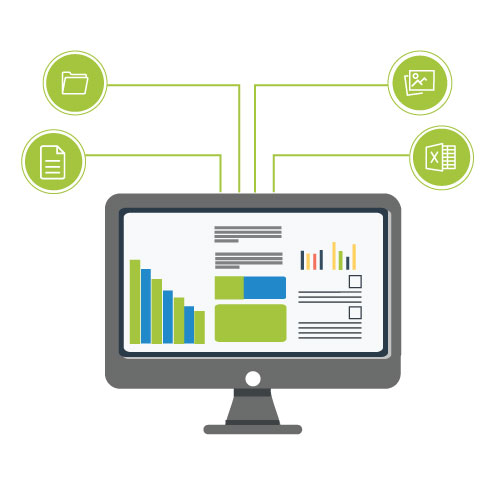Home » AI in Financial Industry in 2021 : A harbinger of faster, smoother, and more reliable business processes.
INSIGHTS
Intelligent solutions. Informed decisions. Unrivaled results.

AI in Financial Industry in 2021 : A harbinger of faster, smoother, and more reliable business processes.
2020-2021 marked a new epoch in the history of business. For the first time, a massive percentage of the workforce was working from home. While employees struggled to cope with the limitations of working virtually, artificial intelligence (AI) emerged as a reliable partner for enterprises worldwide. With AI, enterprises were assured that business processes were not disrupted due to the scarcity of labor and resources.
Now that the worst seems over, there are more reasons than ever to invest in AI. AI has been an infallible ally for many organizations in 2020. It helped them meet deadlines and streamline internal operations while eliminating wasteful expenditure. It helped them cope with burgeoning workloads. The impact AI had on employee productivity was significant. By unfettering staff in back and middle offices from the cycle of mundane, repetitive, and tiresome tasks, AI-enabled the workforce to engage in high-value tasks.
So even as employees return to the office in the coming days, many organizations will continue to amplify their AI efforts. Wayne Butterfield, director of ISG Automation, a unit of global technology research and advisory firm ISG, attributes this new phenomenon to the powerful impact AI had last year. He says, “As the grip of the pandemic continues to affect the ability of the enterprise to operate, AI in many guises will become increasingly important as businesses seek to understand their COVID- affected data sets and continue to automate day-to-day tasks.”
Indeed, in the banking and financial sector, the benefits driven by AI in the past year were monumental. It ensured frictionless interactions, cut repetitive work by half, and reduced error, bias, and false positives - the result of human fallacies - significantly. What organizations got was a leaner and more streamlined, and efficient organization. So there is no question that the value driven by AI in domains like finance and banking, which rely heavily on processes, will only continue to grow in the years to come.
Setting pace for innovation and change
The pandemic has redefined digital. With enterprises becoming more digitally connected than ever before, it is AI that helps them stay operational. As a report from the Insider indicates, there will be significant savings in the middle, back, and front office operations if AI is incorporated. Automation of middle-office tasks can lead to savings of $70 billion by 2025. The sum total of expected cost savings from AI applications is estimated at $447 billion by 2023. Of this, the front and middle office will account for $416 billion of the aggregate.
That AI will set the pace for innovation and change in the banking and financial services sector is all but guaranteed. The shift towards digital had started earlier; the pandemic only accelerated the pace. So here are some of the key areas where Fintechs and banks are using AI :
- Document Processing
- Invoice processing
- Cyber Security
- Onboarding/KYC
Document processing with AI

Enterprises today are sitting on a data goldmine that comes from sources as diverse as enterprise applications, public/private data sets, and social media. However, data in its raw form is of no use. Data, whether it is in textual, pdfs, spreadsheets, have to be classified, segregated, summarized and converted into formats (JSON, etc.) that can be understood by machines and processes before they can be of use to the organization.
Earlier, image recognition technologies such as OCR were used for document processing. However, their scope is limited given that organizations deal with humongous amounts of data in diverse formats including print, and handwritten, all of which are not recognizable with OCR. Document processing platforms have a distinct advantage over traditional recognition technologies such as OCR and ICR. The system is trained first using data sets, and a core knowledge base is created. In time the knowledge base expands, and the tool develops the ability to self-learn and recognize content and documents. This is achieved through the feedback or re-training loop mechanism under human supervision. Realizing that artificial intelligence, machine learning, natural language processing, and computer vision can play a pivotal role in document processing, organizations are increasingly relying on these to enhance the efficiency of many front and back-office processes.
Invoice Processing and AI
Covid-19 has intensified the need for automated Accounts Payable processes. Organizations that were earlier relying on manual and legacy systems for invoice processing were caught off-guard as employees were forced to work from home. Ensuring timely delivery on payment approvals became a challenge due to archaic legacy practices and an increasing number of constraints. Then there was the question of enhanced visibility into outstanding payments. All this led to chaos in invoice processing. A lot of frayed tempers and missed deadlines.
A major chunk of invoice processing tasks is related to data entry. Finance and accounts personnel shift through data that comes from sources such as fax, paper, and e-mail. But a study on 1000 US workers reiterated that no one likes data entry. The survey indicated that a whopping 70 percent of the employees were okay if data entry and other such mundane tasks were automated. With automated invoice processing, it is possible to capture invoices from multiple channels. Identify and extract data (header and lines) using validation and rules. And best in time, with little human supervision, become super proficient in identifying relevant information. It can also do matching and coding. Magic FinServ’s Machine Learning algorithm correctly determined General Ledger code to correctly tag the invoice against an appropriate charge code and finally, using RPA, was able to insert the code on the invoice.
Banks and other financial services stand to gain a lot by automating invoice processing.
- By automating invoice processing with artificial intelligence, organizations can make it easier for the finance staff and back-office team to concentrate on cash-generating processes instead of entering data as -a typical administration function.
- Automating the accounts payable process for instance, can help the finance teams focus on tasks that generate growth and opportunities.
- An automated invoice processing provides enhanced visibility into payments and approvals.
- It speeds up the invoice processing cycle considerably as a result; there are no irate vendors
- It makes it easier to search and retrieve invoices.
Cyber Security and AI
Cybersecurity has become a prime concern with the enterprises increasing preference for cloud and virtualization. Cybersecurity concerns became graver during Covid-19 as the workforce, including software developing teams, started working from home. As third parties and vendors were involved in many processes as well, it became imperative for organizations to ensure extreme caution while working in virtualized environments. Experiences from the past have taught us that data breaches spell disaster for an organization’s reputation. We need to look no further than Panera bread and Uber to realize how simple code left in haste can alter the rules of the game. Hence a greater impetus for the shift left narrative where security is driven in the DevOps lifecycle instead of as an afterthought. The best recourse is to implement an AI-driven DevOps solution. With AI baked into the development lifecycle, organizations can accelerate the development lifecyc in the present and adapt to changes in the future with ease.
Onboarding/KYC and AI
One of the biggest challenges for banks is customer onboarding and KYC. In the course of the KYC, or onboarding banks have to handle thousands, sometimes even millions of documents. And if that were not enough, they also have to take account of exhaust data and the multiple compliances and regulatory standards. No wonder then that banks and financial institutions often fall short of meeting the deadlines. Last year, as the Covid-19 crisis loomed large, it was these tools powered with AI and enabled with machine learning that helped accelerate paperwork processes. These digitize documents and extract data from it. And as the tool evolves with time, it makes it easier for the organization to extract insights from it.
Let us take the example of one prominent Insurtech company that approached Magic FinServ for the resolution of KYC challenges. The company wanted to reduce the time taken for conducting a KYC and for SLAs roll-out of new policies gained confidence and customer appreciation as Magic’s “soft template” based solution augmented by Artificial Intelligence provided them the results they wanted.
Tipping point
Though banks and financial institutions were inclining towards the use of AI for making their processes robust, the tipping point was the pandemic. The pandemic made many realize that it was now or never. This is evident from the report by the management solutions provider OneStream. The report observed that the use of AI tools like machine learning had jumped from about 20% of enterprises in 2020 to nearly 60% in 2021. Surprisingly, analytics firms like FICO and Corinium that a majority of top executives (upwards 65%) do not know how AI works.
At Magic FinServ, our endeavor is to ensure that the knowledge percolates enterprise-wide. Therefore, our implementation journey starts with a workshop wherein our team of AI engineers showcases the work they have done and then engages in an insightful session where they try to identify the areas where opportunities exist and the deterrents. Thereafter comes the discovery phase, where our team develops a prototype. Once the customer gives the go-ahead as they are confident about our abilities to meet expectations, we implement the AI model that integrates with the existing business environment. A successful implementation is not the end of the journey as we keep identifying new areas of opportunities so that true automation at scale can be achieved.
Catering to Banks and FinTechs: Magic FinServ’s unique AI optimization framework
At Magic FinServ, we have a unique AI Optimization framework that utilizes structured and unstructured data to build tailored solutions that reduce the need for human intervention. Our methodology powered by AI-ML-NLP and Computer vision provides 70% efficiency in front and middle office platforms and processes. Many of our AI applications for Tier 1 investment, FinTechs, Asset Managers, Hedge Funds, and InsuranceTech companies have driven bottom and top-line dividends for the businesses in question. We ensure that our custom-built applications integrate seamlessly into the existing systems and adhere to all regulatory compliance measures ensuring agility.


